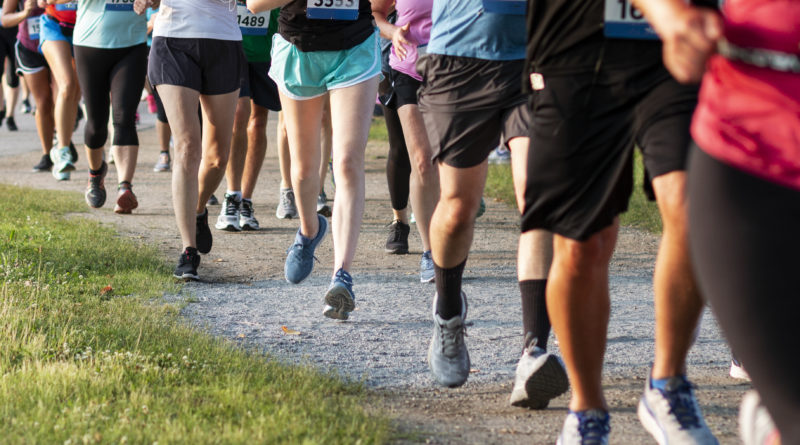Time for a Gut Check?
Everybody poops. I know this is a subject matter avoided in more refined company, but it’s a fact. Unfortunately, runners seem to have to do so at the most inconvenient times, like mid-race when there is not a port-o-potty in sight.
Don’t be embarrassed if this rings true—you are in very good company. One study found that over 60% of runners needed to make a bee-line for the nearest bathroom (or wooded area) during a run to, well let’s just say, “attend to business.”
Marathon legend Bill Rodgers once remarked, “More marathons are won or lost in the portable toilets than at the dinner table.” Seeing a PR slip away should make addressing the topic of Number Two a number one priority.
Runner’s diarrhea, also known as runner’s trots, is characterized by loose bowel movements that typically occur during, or immediately after, a run. What is it about distance running that causes our stomachs to revolt?
For starters, running is a high-impact activity. The mechanical stress of all that pounding isn’t just tough on our knees. All of that up-and-down movement jostles our GI tract and in so doing speeds up how quickly things move along inside.
Another contributor is reduced blood flow to the colon. During exercise the sympathetic nervous system is stimulated, which cues our body to redirect blood flow to our working muscles. That’s great news for our legs, which need that extra blood to deliver oxygen and nutrients, but bad news for our gut. For better or worse these factors are mostly out of our control. However, there are factors we can modify.
Stress can negatively impact our health in countless ways and you better believe digestive health is no exception. Our brain and gut are linked by the Vagus nerve which provides constant communication between the two. In a study published in the Journal of Sports Sciences, male and female runners kept a 30-day journal with detailed notes on their runs as well as GI issues and levels of perceived stress and anxiety. Not surprisingly, the higher intensity and duration of runs correlated with GI distress.
Given what we know about issues arising from mechanical stress and the shunting of blood flow away from the gut, this is only to be expected. However, the most notable result from this study was the positive correlation between the runners’ stress and anxiety levels and GI problems.
Our brains — and thus our guts — don’t distinguish between the stressors of everyday life and pre-race jitters. If you find your stomach acting up even on low-pressure training runs, consider meditation or yoga to reduce overall stress. If your GI problems seem to only crop up during races, working with a sports psychologist to develop strategies to manage emotions prior to and during your race might be beneficial.
But what if runner’s diarrhea isn’t just in your head, but a consequence of what you put in your stomach?
When dealing with GI issues, sometimes the solution comes right at the source; our gut. What we ingest prior to a run is arguably the easiest factor to control, yet can be the hardest to figure out. That’s because everyone is different in terms of what foods are tolerated and which prove to be problematic. A pre-run meal that keeps one runner adequately fueled and digestively sound could send another runner dashing for a toilet. That said, there are some general rules of thumb.
Fiber: In the 48-24 hours leading up to a race it is best to reduce fiber intake. Dietary fiber is normally considered a nutritional must for keeping us regular, but in the day or two leading up to a race it can be more foe than friend. Limit high-fiber grains, beans, legumes, seeds, vegetables and high-fiber fruits, especially the morning before a race or long run. Those bran flakes topped with seeds and berries can wait.
Fat: Dietary fat delays gastric emptying time, which normally is a great way to increase the satiety of a meal. However, in the few hours leading up to a run the last thing we want is food sitting around in our stomach. You don’t need to avoid fat entirely, but a conservative spread of peanut butter on a bagel is plenty to keep you satisfied without causing complications.
Caffeine: That cup of coffee may get you moving a little quicker in the morning, but it can also get your bowels moving quicker as well. Caffeine from coffee or any other source like tea or soda can move foods through the GI tract faster, which if not timed well can spell disaster. That doesn’t mean you have to forego caffeine entirely, especially considering that it is a proven ergogenic aid. To reap the benefits of caffeine, keep it to one cup and allow time to use the bathroom before your run.
Sugar alcohols: Commonly used in sugar-free gums, candies, protein bars and even ice cream, sugar alcohols commonly cause gas, bloating and diarrhea. Not great on an average day and certainly far from ideal when running. Steer clear of products with sorbitol, lactitol, xylitol or mannitol listed in the ingredients.
Dairy: Even a mild lactose-intolerance can rear its ugly head when dairy is consumed prior to exercise. There are ample dairy-free milks, yogurts, cheeses and the like so if you have any doubt that dairy might be a problem for you, why risk it?
Hydrate: It may sound counter intuitive, but dehydration can actually cause runner’s diarrhea. As previously mentioned, decreased blood flow to the colon can trigger diarrhea and dehydration only exacerbates this. Hydrating adequately before and during can help offset the water loss experienced during exercise.
Unfamiliar foods: If you wouldn’t test out a new pair of shoes on race day then why would you try out a new pre-run breakfast? Stick with familiar foods that you have ideally consumed prior to long training runs and know work well for you. If you’re traveling for a race, identify a restaurant or store that has your tried and true meals.
Even the most careful pre-run diet can quickly be derailed by what is consumed during a long run. All those gels, gummies and sports drinks are essential fuels, but are also an oft-cited cause for GI distress.
Just as it is essential to train our legs to complete a longer distance, we must also train our gut to tolerate ingesting foods and beverages while running. One study showed that athletes who fail to train their body to do so are twice as likely to experience GI issues than those who have.
Depending on intensity, for runs lasting 90 minutes or more runners should aim for anywhere from 30 to 90 grams of carbohydrates per hour. Exceed that threshold, say for instance by washing down a few gels with a Gatorade in the span of an hour, and fluid is pulled into the GI tract resulting in, you guessed it; diarrhea.
That is a lot of information to digest (pun intended) and the biggest takeaway is that every runner is different and needs to experiment with what works best for them.
The Director of Nutrition at The Edge in South Burlington, and an adjunct nutrition professor at UVM, Jamie Sheahan has run more than 40 marathons.



